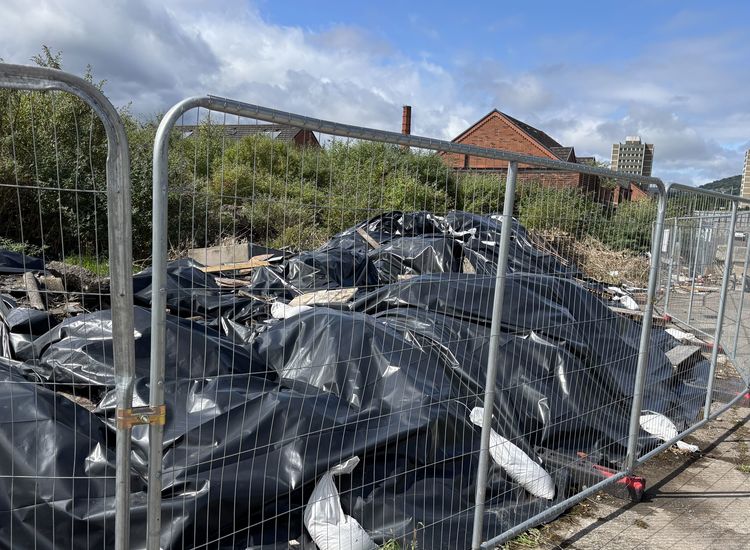Author Tom Phelan pictured on a trip home to Ireland.
By Tom Phelan
When Maeve Towey was born in the mid-1930s, her mother died on the birthing bed. At the wake, the newborn lay swaddled at the foot of the corpse. But the next day, unable to care for her, Maeve’s bereaved father, Mick, wrapped the baby in a towel and carried her to the Mountmellick Workhouse, one mile away. His young son, Eamon, trailed behind him.
Within a few years Mick himself died. His sister and her husband, with their three children, moved into the Towey’s three-room cottage in Laragh to care for the orphaned Eamon. The first thing they did was bring little Maeve home from the Workhouse.
When I was a child, the teenage Maeve often visited our house. Her hair was the color of a fox. On sunny days she brought some of us children out to play in the grassy Hill Field. There she showed us how to make daisy chains. She taught us a rhyming riddle:
“Elizabeth, Elspeth, Betsy, and Bess;
they all went together to seek a bird's nest.
They found a bird's nest with five eggs in,
they all took one, and left four in.”
Maeve told us that the furry, green-yellowish catkins growing on sally trees in early spring were goslings, and we believed her.
In her early teens Maeve suffered an epileptic seizure. It would be the first of many. In the town, the grown-up Maeve worked at several counter jobs, but they did not last because of the terror her seizures induced in the customers. In her late 20s, she entered a religious order in Ireland, and when she was professed, she was sent to a convent in the south of England.
In the mid-1960s I was ordained a priest and was appointed to a parish in Brighton on England’s south coast. Eamon Towey, Maeve’s brother, by then a licensed electrician in London, was married and had young children. On many occasions he and his wife invited me to their house for dinner. Those times were enjoyable respites from rectory life.
After one of these visits, while walking me to the Underground station, Eamon told me Maeve was in an “asylum” in Surrey. “I can’t bring myself to go there to see her. I can’t bear to think that my own sister is a lunatic.”
Eamon put his hand on my arm. “Tom, will you visit her?” he almost begged. I said I would.
On a summer afternoon, I drove to Surrey. It was a sunny day, and as I neared the institution where Maeve was a patient, the road was lined with tall rhododendrons, all clothed in a profusion of blossoms. I had never seen this kind of floral display except in fairy-tale books. But suddenly the beauty was behind me and I was in front of a monstrous, red-bricked building, its million windows guarded by black, iron bars. Thousands of chimneys stuck out of its head like the hair of someone receiving electric shock treatment. I sat in the car for a few minutes working up the courage to go in.
“You’ll find Sister Aloysius in the day room,” a receptionist said. “Follow the signs and I’ll unlock the doors from here when you knock on them. Knock hard so the microphone hears you.”
When I opened the third door, I stood and gaped. The day room seemed to be as big as ten airplane hangars. The institutional smell of living, venting bodies in unstirring air was powerful. It seemed thousands of patients were sitting in armchairs and sofas, all scattered willy-nilly. Many of them were staring at the floor.
I was tempted to walk away, to tell Eamon I had seen Maeve, that she was happy as a lark. But my promise to Eamon, rather than any underlying concern for Maeve, kept me from fleeing this terrible warehouse.
And then I saw her. There was Maeve, her nun’s white habit lighting her up in the sea of ill-fitting browns and blacks as if she were sitting in a spotlight. She was as visible “as a star when only one is shining in the sky.”
When she recognized me, Maeve ascended from her chair with a cry of delight and a smile as broad as the mouth of the Shannon. But her convent training stopped her from embracing me. “Tom, Tom, Tom,” she said over and over, tears running down her face. Then she said, “I’m in charge of the hens. Come on and I’ll show you.”
Through the obstructing furniture and its occupants, she wound her way out of the day room. Soon we arrived at the chicken-wired enclosure with three hens inside. “I’m the only one who knows anything about hens,” she said. Maeve pulled open the ill-hung gate. The birds ran out and then followed her back into the coop. So did I.
A plump Rhode Island Red flew up to Maeve and she caught it, embraced it like a mother holding a child. Maeve cooed and kissed the top of the hen’s head. “Oh, my little Doreen, my little baby. Did you lay an egg for Mammy today?” She held her open palm out and even though there was nothing in her hand, the bird pecked it and Maeve giggled. “You’re ticklish,” she said, as she put Doreen down on the ground.
I stood there not knowing what to do or say while Maeve repeated this ritual with “Lily” and “Sheila.” When she finally pushed opened the door to leave, I said, “They’re grand hens, Maeve.”
“And they are mine and no one else’s.”
“Do you ever think of Laragh Lane, Maeve?” I asked, hoping to open a conversation.
“No,” she said sharply.
“Do you remember the Hill Field when we were small? You taught us how to make daisy chains.”
“I wanted to set a clutch of eggs but they wouldn’t give me a rooster. No rooster, no chicks.”
“The hens love you, Maeve,” I said.
“I know, and I love them.”
As we began walking back to the day room, I said, “Maeve—”
“Don’t call me that. I’m Sister Aloysius.”
I began again. “Sister Aloysius, did you ever hear this riddle: “Elizabeth, Elspeth, Betsy, and Bess; they all went together to seek a bird's—”
“There’s vox Dei for tea,” Maeve said, quickening her step at the sound of the bell. “Reverend Mother will punish me if I’m late.” She hurried up the steps to the day room door and disappeared. I never saw her again.
Four months later, Eamon phoned to tell me Maeve had died in the throes of a seizure. She was 39 years old.
There were only two mourners at her burial—Eamon and myself. The cemetery was so crowded with headstones that if they had been weeds they would have smothered each other. Maeve’s grave was beside a narrow path. Eamon held an umbrella while I recited the prayers of interment and sprinkled holy water on the coffin. While we stood there watching the grave being filled in, near-horizontal rain was lashing the earth.
As we parted at the cemetery gates, Eamon said, “Tom, I don’t want anyone to know where Maeve died. Everyone will think there’s madness in my family.”
When I remember Maeve, lines by William Wordsworth come to mind:
“She dwelt among the untrodden ways
“Beside the springs of Dove,
“A Maid whom there were none to praise
“And very few to love.”
© 2021, Glanvil Enterprises, Ltd. Tom Phelan is the author most recently of the memoir “We Were Rich and We Didn’t Know It.” For more about his books, visit tomphelan.net.









